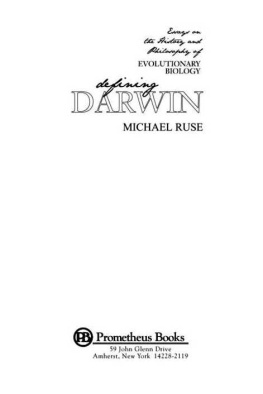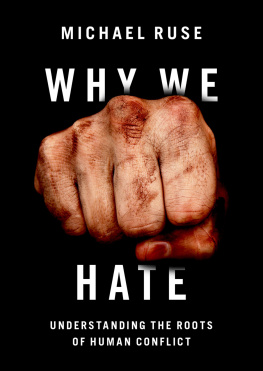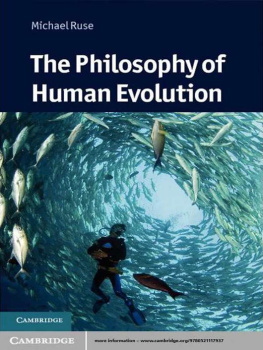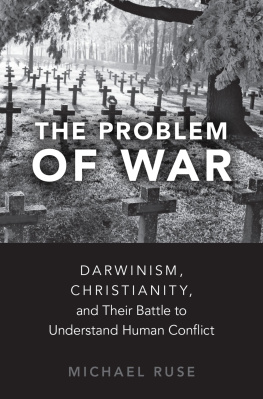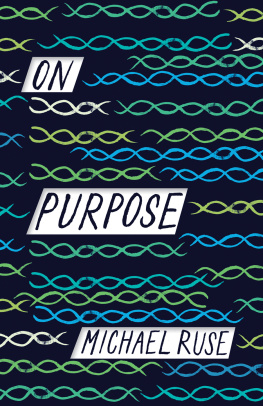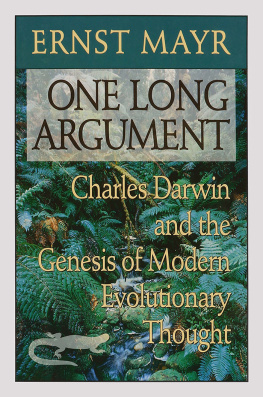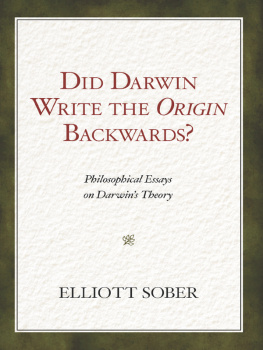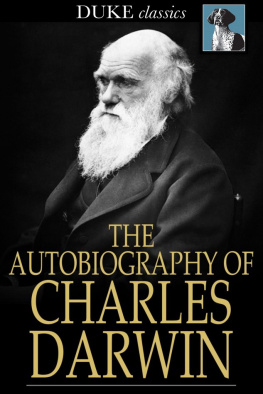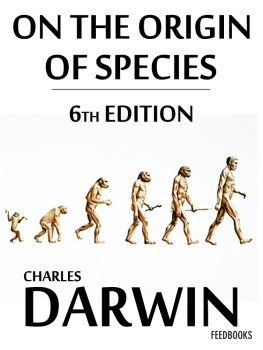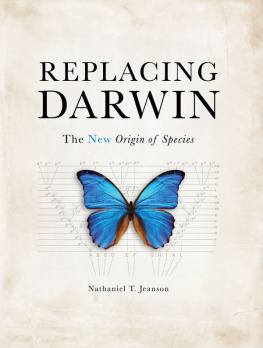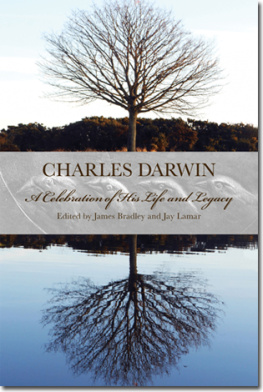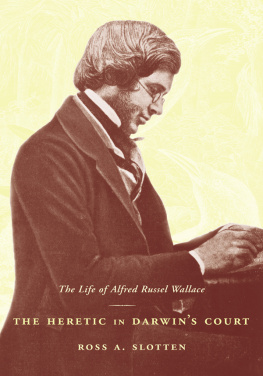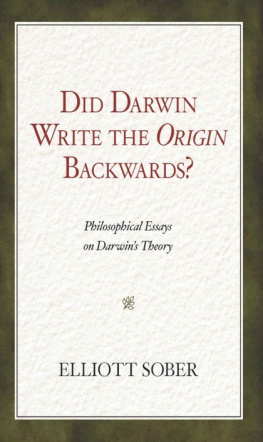



For:
Matt Day
Fritz Davis
John Kelsay
Joe Travis
CONTENTS
................................................ 9
ACKNOWLEDGMENTS ................................. 11
PART I: DARWIN'S GREAT WORK
One: On the Origin of Species ..................... 17
PART II: THE EARLY YEARS
Two. Kant and Evolution ........................ 35
Three. Darwinism and Mechanism .................. 51
Four. Kicking against the Pricks: Alfred Russel Wallace the Rebel .............. 73
PART III: THE MIDDLE YEARS
Five. Adaptive Landscapes and Dynamic Equilibrium: The Spencerian Contribution to TwentiethCentury American Evolutionary Biology ....... 95
Six. Julian Huxley and George Gaylord Simpson on Evolution and Ethics ................... 121
Seven. Evolution and the Novel ................... 153
PART IV THE LATER YEARS
Eight. Evo-Devo: A New Evolutionary Paradigm? .... 177
Nine. Darwinism Explains Religion (?) ............. 199
Ten. Evolution as Religion: Are the Creationists Right? ........................ 215
PERMISSIONS .......................................... 243
REFERENCE LIST ...................................... 245
INDEX ................................................. 257
PREFACE
The child is the father of the man. This holds true as much intellectually as it does emotionally. I trained as a philosopher of science in the 1960s. Always more interested in the fabric of science than in purely logical exercises, I came to evolutionary theory as something worth studying and this has stayed with me all of my life. I read Charles Darwin with as much pleasure today as I did forty years ago. At the same time, I was plunged into the big debate of the day, symbolized by the clash between the Austro-British philosopher Karl Popper and the American physicist-turned-historian Thomas Kuhn. Is science about an objective reality and is the aim to describe and understand that reality as best one can, or is science a far more subjective enterprise, influenced by the culture of the day and as much a creation as an invention? That seemed to me then to be the really important question to be answered, and it seems to me now to be the really important question to be answered. How it is to be answered is also something that comes from this same past. Kuhn told us that to understand science we must turn to its history as well as its present, and as one who was more and more enthused by evolutionary ideas, this was music to my ears. So here I am today: fascinated by evolutionary thinking, believing that the big question is that of objectivity and subjectivity, and convinced that the way to answers is through a study of the science itself, its past and its present. And this is what this collection of essays is all about.
As you will learn very quickly, I do not look upon my work as purely epistemological, that is, to do with truth and justification. I believe that moral issues, within and without science are also vitally important. I would not be interested if this were not so. On the one hand, perhaps more wearing my philosophical hat, it is important for me to understand evolutionary thinking and to defend its standards, its integrity, its results. Today, the forces of darkness, otherwise known as the biblical literalists-in their most modern incarnation, the Intelligent Design Theorists-stand at our gates, trying to enter and to attack evolutionary thinking and its place in school curricula. Fighting these people is itself a moral crusade. On the other hand, perhaps more wearing my historical hat, it is important for me to understand how it is that evolutionary thought has through the ages come to be more than just science, and has played roles in philosophy, in literature, in religion, and more. And always these roles have had underlying social and moral connotations. Finding the truth about these implications and interpretations of evolutionary thought is an important task, and it, too, is moral-both in content and in the importance of being able to separate the real or pure science from all else.
The essays before you-some published, some unpublished, but all tried out in lecture halls-were written in the past ten or so years and have been (usually lightly) revised for this collection. I am pleased that, taken together, they do make a coherent and ongoing whole. They go from the early days of evolutionary thinking down to the present and always the underlying concerns are those detailed in the paragraphs above. I have called the collection Defining Darwin, because above all it was Charles Darwin's thinking that made evolutionary ideas worth considering, and because it is the nature of Darwin's own thought and the things that people made of this that motivate me in my inquiries.
ACKNOWLEDGMENTS
t remains only for me to thank the many people over the past decades who have listened to me talk on things evolutionary and who have sharpened my thinking with their penetrating questions. I am much in the debt of my many assistants down through the years: Alan Belk, Christopher Pynes, Jeremy Kirby, Jason Zinser, Charles Alt, Yasha Rohwer, Peter Takacs, Sarah Whylly, and Samantha Muka. As always, Stephen L. Mitchell and the folk at Prometheus have been friends rather than business acquaintances. I am grateful for support from my home institutions-in Canada, the University of Guelph from 1965 to 2000 and then in the US, Florida State University from 2000-and also for research funds from (in Canada) the Social Sciences and Humanities Research Council and then (in the US) the William and Lucyle Werk- meister Fund. Finally, my family-Lizzie, Emily, Oliver, and Edward, not to forget Nigel, Rebecca, and Christian-are what make it all worthwhile. The collection is dedicated to the men with whom I have team taught since I came to Florida. Ultimately, passing on ideas to the next generation is the most important thing that any of us do.

PART I: DARWIN'S GREAT WORK

harles Robert Darwin (1809-1882) is rightly known as the father of evolutionary theory. He was not the first evolutionist-his grandfather Erasmus Darwin was one of those who came before himbut in his great work, On the Origin of Species by Means of Natural Selection, or the Preservation of the Favoured Races in the Struggle for Life, published in 1859, Darwin not only established the fact of evolution beyond reasonable doubt (as they say in the law courts), he proposed natural selection, the mechanism of change that is recognized today as the chief cause behind the development of organisms down through the ages. This first essay of this collection introduces Darwin's great book, sketching the main features within its covers. The ancient Greek philosopher Heraclitus said that you cannot step into the same river twice. It would be a sad reflection on evolutionary studies if today we believed no more about evolution than did Darwin. Indeed, the truth is that there is virtually nothing today in evolutionary studies that corresponds exactly to the facts of the Origin. The ancient Greek philosopher Parmenides said that nothing changes, all motion is illusory This is equally true of the Origin. The details are all changed, but the logical structure is the same today as it was for Darwin. As I say in the essay, ultimately Darwin got it right. That is the reason to celebrate him and his theory. We follow in his path.

